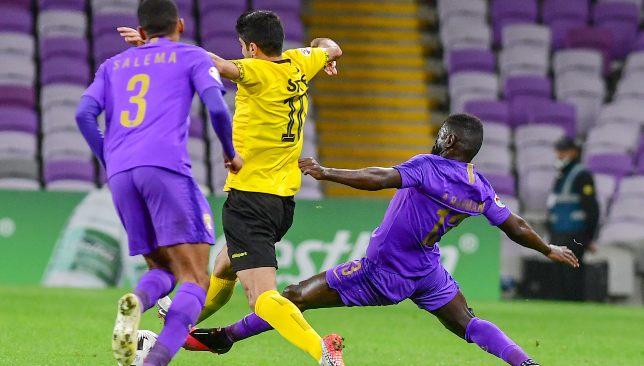
The UAE’s AFC Champions League quartet were a 90th-minute scramble away from total wipe-out.
Rim Chang-woo’s last-gasp leveller earned Al Wahda a share of the spoils when the 2020 group stage kicked off last week, against depleted Saudi Arabians Al Ahli Jeddah.
This opportunistic strike from a corner allowed 2019’s sole knockout-stage entrant to avoid the fates suffered by Arabian Gulf League leaders Shabab Al Ahli Dubai Club, domestic holders Sharjah and – the Emirates’ sole continental champion in 2002/03 – Al Ain.
This false start has left the nation’s finest under pressure ahead of Monday and Tuesday’s match-week two. Plus, in search of solutions to prevent their descent in Asia’s premier club competition of being enshrined as a trend.
‘Timing’ and ‘talent’ are the broad themes that underpin this shift.
A golden spell, fuelled by the ‘Golden Generation’, at the mid-point of the previous decade feels like an age away. Al Ahli – now subsumed – and Al Ain made successive final appearances from 2015-16, narrowly losing to East Asian opposition both times.
At a basic level, fading forces such as statuesque centre-back Ismail Ahmed and 2015 AFC Player of the Year Ahmed Khalil have not been supplanted by indigenous talents from the same stratum. Omar Abdulrahman and Ali Mabkhout, arguably this group’s two leading lights, find themselves outside of the competition at Al Jazira.
Players of promise exist. Many of whom have emerged at Wahda, such as winger Khalil Ibrahim and prodigious goalkeeper Mohammed Al Shamsi.
But the potential of prospects such as Al Ain right-back Saeed Juma – terrorised in Sepahan’s 4-0 humbling – and Shabab Al Ahli midfielder Abdullah Al Naqbi – solid in 2-1 defeat at Pakhtakor – is yet to be fulfilled.
Recent failure of an Under-23 side to make the Tokyo 2020 Olympics further emphasised this reality.
Talent acquisition, just like identification, is another problem.
Al Ain have witnessed Brazilian forward Caio, South Korea battler Lee Myung-joo (now back in the UAE at Wahda) and Sweden No9 Marcus Berg depart on free transfers since their final defeat to Jeonbuk Hyundai Motors four years ago. Their enervating run of five-successive ACL home losses, in the full tournament, points to an inability to acquire fresh foreigners of the same standard.
انضم الينا غدا في استاد راشد
— نادي شباب الأهلي (@Shabab_AlAhliFC) February 16, 2020
شجع شباب الأهلي 💚❤️
واحصل على تذكرة المباراة 🎟 #شباب_الأهلي #دوري_ابطال_اسيا pic.twitter.com/WK5Qenv33Y
Ahli’s run to 2015’s showpiece versus China’s Guangzhou Evergrande was propelled by prolific ex-Benfica striker Lima’s four goals from the quarter-final stage. Current incumbent Pedro Conde excelled at Bani Yas, yet is a relative journeyman from Greece and Spain’s lower leagues.
These problems have been acerbated by timing.
The UAE’s drop has coincided with the rise of regional rivals.
Across the border in Saudi Arabia, 2018’s support from the General Sports Authority gained tangible effect in November when ex-France centre forward Bafetimbi Gomis helped terminate Al Hilal’s 19-year wait to be crowned Asian kings once again.
Abderrazak Hamdallah, 2019’s global top scorer, produced all of his 57-goal tally for Saudi Professional League holders Al Nassr. The ex-Morocco international notched twice versus Wahda, proving the difference in a tense round-of-16 tie.
Mohammad Mohebi and Mehdi Ghayedi stand at the vanguard of a new group of Iranian stars to be, while Uzbekistan’s challengers keep punching above their weight.
The projected bedrock of hosts Qatar’s side at World Cup 2022, such as 2019 AFC Player of the Year Akram Afif and record Asian Cup top scorer Almoez Ali, are steadily maturing.
Football also operates in cycles. The recent travails of Manchester United and AC Milan in Europe point to this universal truth.
Emirati clubs are not insulated from this. Indeed, none of their sides advanced from the groups between 2008-11.
😙🏆💙#ValentinesDay pic.twitter.com/tpKEM1q8tD
— #ACL2020 (@TheAFCCL) February 14, 2020
Put in that context, this spell is just a mere blip.
Strong results this week would quieten alarm bells.
Shabab Al Ahli showed grit and ability amid testing conditions at Uzbekistan powerhouse Pakhtakor, before succumbing to prolific Serbian Dragan Ceran’s scuffed winner. This 2-1 loss is no embarrassment versus opponents who’ve won six of the last seven home ACL matches at their Pakhtakor Central Stadium-fortress.
Perform to this level on home soil this Monday and champions Hilal could come unstuck during this repeat of 2015’s iconic semi-final.
Faisel Darwish’s world-class free-kick gave Saudi Arabia’s Al Taawoun a 1-0 win and condemned Sharjah to a losing return after 16 years away. But with electric Brazilian playmaker Igor Coronado, potentially, back in their ranks after long-term injury, Iran giants Persepolis may be downed.
Wahda’s hopes of a first three-point haul are bolstered by the imminent departure of Al Shorta’s star man, Safaa Hadi, to Russia’s Krylia Sovetov Samara.
Only Al Ain face an unenviable task in welcoming Riyadh behemoth Nassr on Tuesday.
A comeback is within the foursome’s reach. But would this represent a return to an upwards trajectory, or simply a short-term salve to the UAE’s ails?